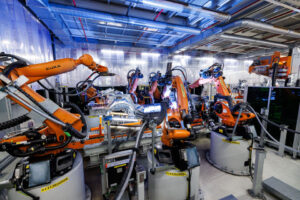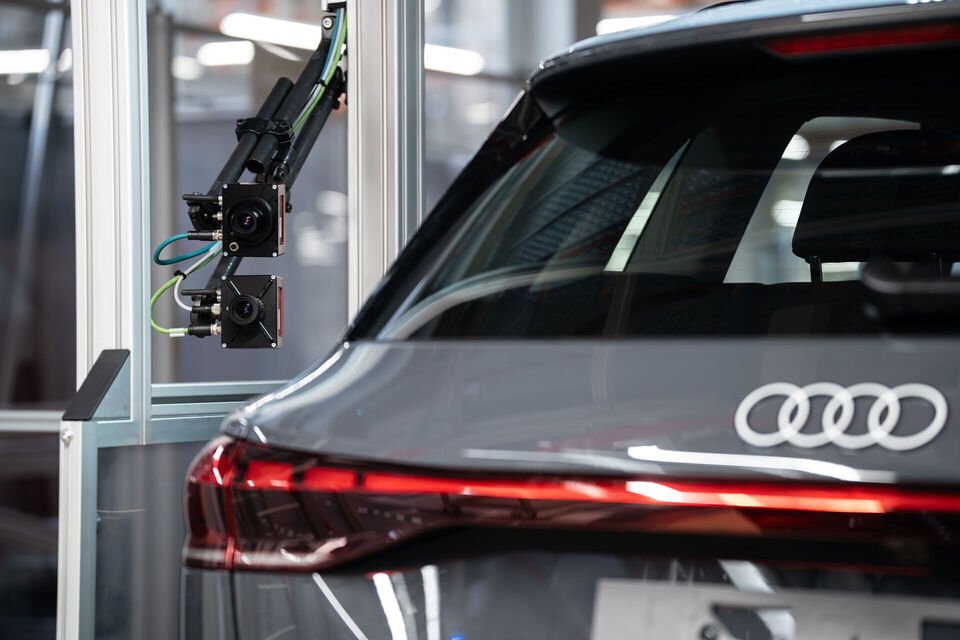
Audi ramps up AI use in vehicle production
By onAnnouncements | Market Trends | Technology
Audi has increased its use of artificial intelligence (AI) in its vehicle production lines to improve efficiency and quality, according to a press release from the OEM.
“The aim is to fully exploit the potential of AI and data – both in company processes and in the customer experience with services and products,” the release states. “AI is currently making the biggest impact in the areas of production and logistics.”
Audi currently operates more than 100 AI projects in various stages of development at its production facilities, which the company is gradually integrating into series production processes and expanding. For now, the primary focus is on AI-supported quality monitoring and generative AI.
“AI is the game changer in our industry,” said Gerd Walker, Board of Management for Production and Logistics member, in the release. “By using it in a targeted way, we are creating a production environment that is not only more efficient and cost-effective but that also meets the highest quality standards and supports people as ideally as possible. That is why we are focusing on integrating AI wherever it is possible and makes sense, and systematically expanding applications.”
Along with the introduction of new AI tools, Audi is moving forward with the systematic expansion of its data organization, particularly in the area of production. There, the volume of data is higher than anywhere else in the company, hundreds of petabytes of data already exist and thousands of gigabytes of new data are created every day.
“Artificial intelligence enables us to make more extensive use of our enormous wealth of data in production and accelerates the journey of our 360factory towards becoming a data-driven factory,” Walker said.
The 360factory is Audi’s production strategy for fully connected, innovative, and sustainable manufacturing, according to the release.
Audi recently began utilizing AI to analyze bids as part of its tendering process with Tender Toucan. The tool uses a set of specifications to create a list of requirements, searches for the relevant sections in the bids, and evaluates the degree to which they are fulfilled. Employees check and complete the tool’s work with a 30% time savings, the release says.
Tender Toucan will be introduced for the series production planning of drivetrains and high-voltage batteries in the summer; a further rollout is planned at Audi and in the Volkswagen Group. Its development also serves as a basis for many other AI applications at Audi.
IRIS, an AI application for image processing, was recently implemented at Audi’s Ingolstadt and Neckarsulm assembly plants.
The tool uses cameras to ensure technical data labels are correctly attached to vehicles, including accurate content in the right language on the right component in the correct position. Employees continue to perform spot checks. According to Audi, IRIS saves roughly 1 minute of production time per vehicle.
Audi also recently joined forces with Siemens to introduce another AI-supported quality check to series production in its Neckarsulm body shop.
Previously, employees manually inspected the underbody of vehicles for weld splatter and, if present, removed it. If left, the metal deposits could lead to cable breakages. Now, Weld Splatter Detection (WSD) uses AI to detect weld splatter.
Audi says the AI application not only saves time in production but also improves occupational safety and ergonomics for employees.
Over the past several years, Audi has built a strong network of AI experts and closely cooperates with Innovation Park Artificial Intelligence in Heilbronn, among others, according to the release.
The IPAI is set to become Europe’s largest AI network and will begin constructing a 23-hectare campus this year, the release says. As a member of the Heilbronn-based think tank, Audi will have an office at the new campus, as it does on the current IPAI site.
The Audi Böllinger Höfe site is also located in the immediate vicinity. This Audi location for small series production serves as a real-world laboratory for digital production technologies as part of the Automotive Initiative 2025, an innovation network for digital transformation in the automotive industry.
In March, Volvo Cars shared that it can now synthesize incident data collected by the advanced sensors in its new models, such as emergency braking, sharp steering, or manual intervention, to create “even safer” vehicles.
Volvo uses AI-generated life-like virtual worlds to enhance the development of its safety software, and with data collected, can “probe, reconstruct, and explore” to better understand how incidents can be avoided, according to a press release from the OEM.
Around the same time, GM announced an expanded collaboration with NVIDIA to develop next-generation vehicles, factories, and robotics using AI simulation and accelerated computing.
Dave Richardson, GM’s software and services engineering senior vice president, wrote in a press release at the time that the OEM’s investment in NVIDIA GPU platforms for AI model training will be extended to create digital twins of assembly lines via the NVIDIA Omniverse platform, enabling virtual testing and production simulations to reduce downtime. NVIDIA’s DRIVE AGX will also be used for future in-vehicle ADAS hardware as well as in-cabin enhanced safety driving experiences.
Images
Featured image: AI-supported quality inspection for car body construction in Neckarsulm using image-processing AI, Weld Splatter Detection, to identify metal deposits on the underbody. (Provided by Audi)
IRIS uses cameras to check labels for technical information and proper application to vehicles. (Provided by Audi)

